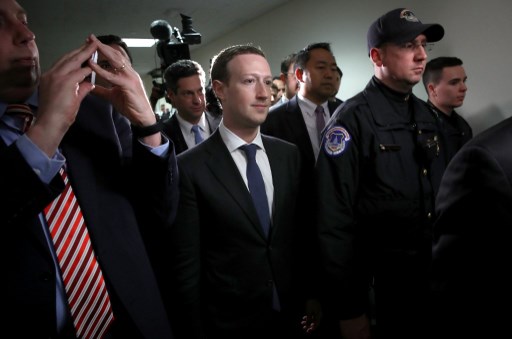
WASHINGTON, United States (AFP) — Facebook founder Mark Zuckerberg’s appearances before US lawmakers this week to address privacy and security lapses at his company promise to be some of the most anticipated congressional testimony in years.
But the 33-year-old billionaire’s appearances have had their fair share of historic and sensational predecessors, some that brought virtually unknown Americans into the national spotlight, and others that have impacted presidential ambitions.
Here are four modern-day congressional hearings that shocked and/or riveted Americans.
Iran Contra, 1987:
US Marine lieutenant colonel Oliver North became a household name spending days before a joint congressional committee tasked with investigating the Iran Contra scandal, which rocked the Reagan administration in the 1980s.
In hearings broadcast nationwide, North admitted he had lied to Congress about his participation in a plan to aid Nicaraguan Contra rebels with profits from secret arms sales to Iran, which were made to encourage the release of US hostages held in Lebanon.
“It is difficult to be caught in the middle of a constitutional struggle between the executive and legislative branches over who will formulate and direct the foreign policy of this nation,” he told lawmakers.
North was arrested and charged with deceiving Congress, but the charges were dismissed in 1991.
Clarence Thomas confirmation, 1991:
Perhaps no testimony since Watergate so hypnotized the public as the Supreme Court confirmation hearings of Judge Clarence Thomas — and the testimony of his accuser of misconduct, Anita Hill.
Twenty million households tuned in at the prime time in October 1991 to see a US Senate panel grilling Thomas and Hill about her lurid accusations of indecency and abuse against Thomas, who was nominated by President George Bush.
Hill spoke of how Thomas repeatedly pressured her to go out, how he “told me graphically of his own sexual prowess,” and how his attempts to discuss sex or pornographic movies left her “extremely uncomfortable.”
Thomas, at his own fiery appearance before senators, called his hearing “a high-tech lynching.”
Thomas was ultimately confirmed on a 52-48 vote, and he still serves on the bench.
Hillary Clinton, 2013/2015:
Clinton was US secretary of state in 2012 when militants stormed US facilities in Benghazi, Libya and killed ambassador Christopher Stevens and three other Americans. The incident triggered a protracted political controversy that led to hours of often intense testimony by Clinton.
In responding to a senator’s remark about how she was slow to make contact with Americans in Benghazi, Clinton at a January 23, 2013 foreign relations committee hearing delivered a forceful defense of the Obama administration’s handling of the tragedy.
But it also framed what became a go-to argument for Republicans against her presidential candidacy in 2016.
“With all due respect, the fact is we had four dead Americans. Was it because of a protest, or was it because of guys out for a walk one night who decided they’d go kill some Americans? What difference, at this point, does it make?” Clinton boomed.
“It’s our job to figure out what happened, and do everything we can to prevent it from ever happening again.”
Two years later, in 2015, she held court for an 11-hour closely watched House hearing in which she avoided mis-steps that could harm her presidential campaign.
FBI ex-director James Comey, 2017:
One month after President Donald Trump fired FBI director James Comey, the ousted law enforcement leader testified before the Senate Intelligence Committee on June 8, 2017, when palace intrigue and concern about the ongoing probe into Russia’s meddling in the previous year’s presidential election was reaching fever pitch.
Comey branded the president a liar, and said he hopes Trump had recorded their conversations, as Trump suggested he may have done.
“Lordy, I hope there are tapes,” he said.
Trump had allegedly demanded Comey pledge his loyalty, and urged the FBI chief to drop the investigation of sacked national security advisor Michael Flynn, who later pleaded guilty to lying to the FBI about speaking to Russia’s ambassador.
“I was fired in some way to change — or the endeavor was to change — the way the Russia investigation was being conducted,” Comey told senators in a gripping three-hour hearing. “That is a very big deal.”
© Agence France-Presse







